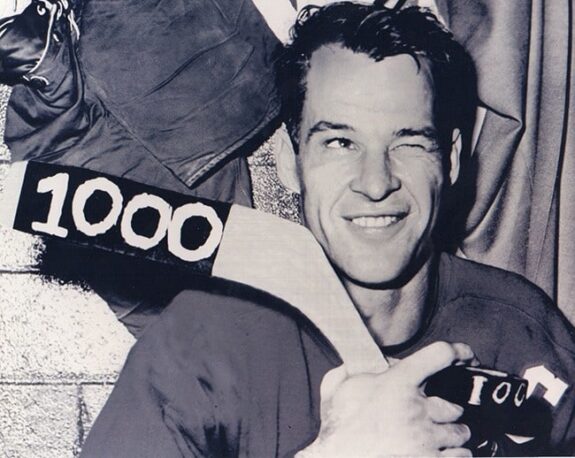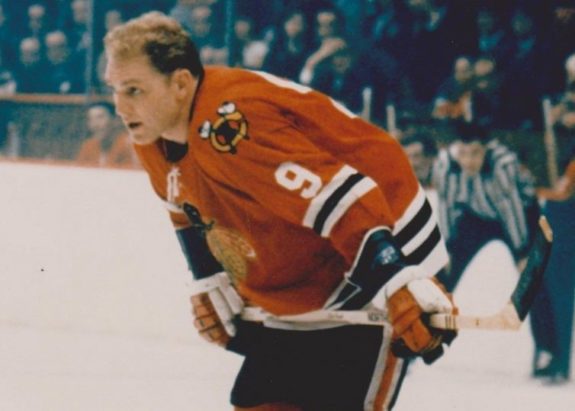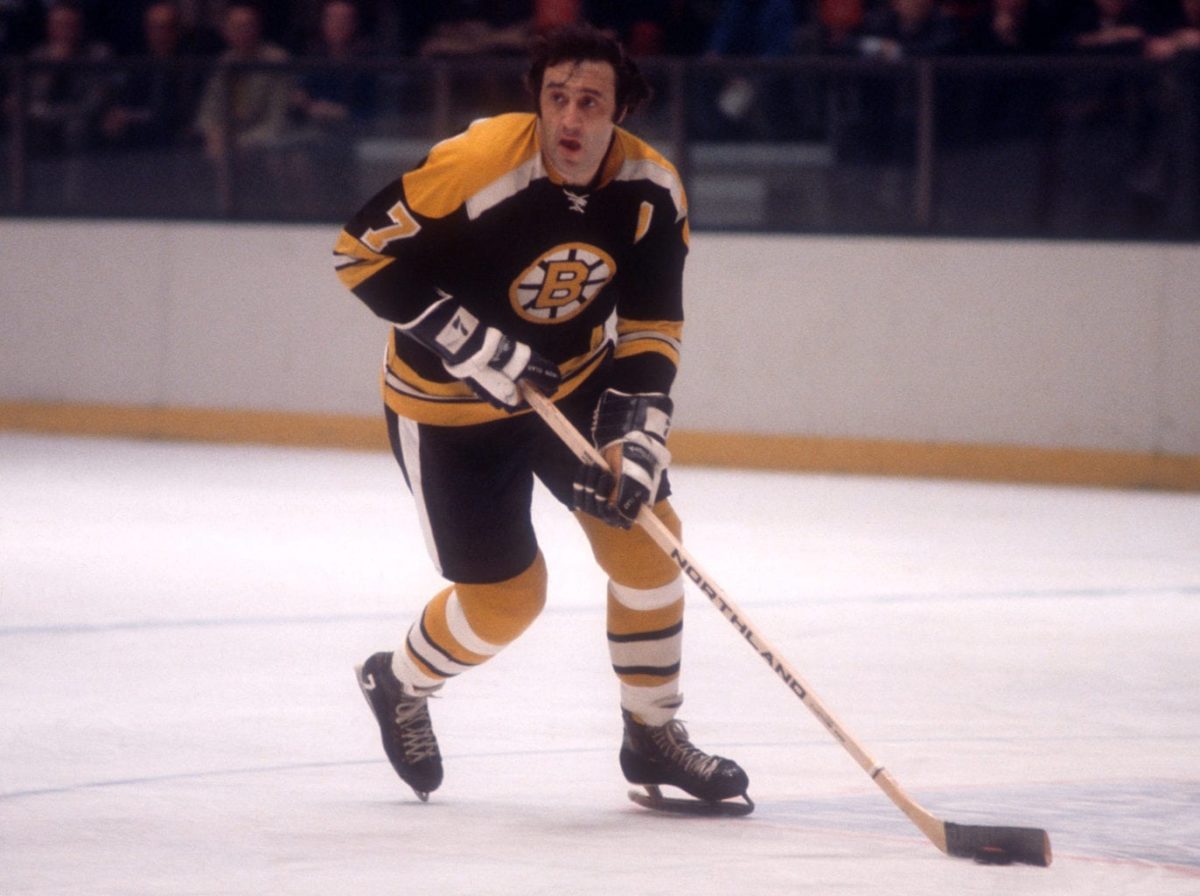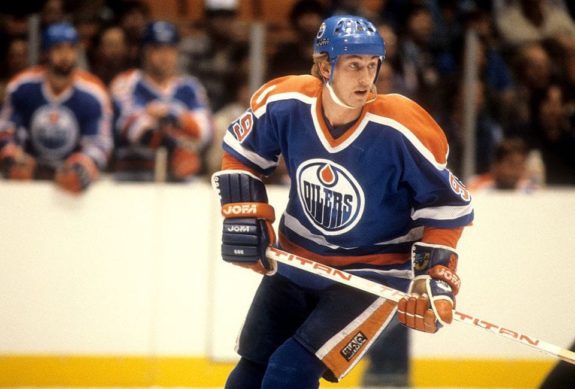Hockey fans across the globe are aware that Wayne Gretzky has owned the NHL regular season scoring record since his second year in the league, 1980-81. Even though he broke this record on two other occasions, there’s no denying that Gretzky is the longest-reigning record holder, and it may remain that way for years to come.
Since the NHL came into existence in 1917-18, only 11 skaters have had the privilege to hold the league’s regular season scoring record. Interestingly, as the game evolved, so did the scoring total, with players starting at 48 points, moving up to 97 points, breaking through at 126 points, and settling at the current mark of 215 points.
Related: 10 NHL Players with the Most Stanley Cups
So, since this particular route in hockey history leads to Gretzky, let’s step back in time to see all the players who once claimed one of the most sought records in professional hockey.
The Beginning of the NHL (1917 – 1942)
Initially, one of the NHL’s most famous players was Montreal Canadiens’ Joe Malone. Despite scoring the first goal in franchise history, he never won the Stanley Cup during his seven-year career. However, the Hall of Famer was the league’s first regular season scoring champion, collecting 48 points in 20 games in 1917-18.
Historically, Malone edged Cy Denneny (Ottawa Senators) by two points for the crown while winning the goal title 44-36. After setting the scoring record in the first season, Malone broke the mark two seasons later in 1919-20, collecting 49 points thanks to 39 goals and ten assists in 24 games.

Ultimately, the record of 49 points would stand for eight seasons until another Canadiens icon, Howie Morenz, would become the first player in NHL history to surpass the 50-point barrier. Thanks to 33 goals and 18 points in 43 games, the eventual three-time Stanley Cup winner would hold the record for two seasons, losing his spot in 1929-30.
Although Morenz finished the 1929-30 season with 53 points, he ranked as the league’s seventh-highest scorer, with four new players reaching 50 points, two surpassing 60, and Cooney Weiland setting the record at 73 points. After two players from Montreal owned the regular season scoring record since 1917-18 (13 years), a player from the Boston Bruins would lay claim to the mark for the first time.
Interestingly, at 25 years old, in his second NHL season, Weiland exploded for 73 points in 44 games before losing in the Stanley Cup Final. Besides setting the record, he became the fourth player to net 40 goals in a campaign (43), following Malone (44) in 1917-18; and Dit Clapper (41) and Morenz (40) in 1929-30.
Ultimately, Weiland’s reign at the top remained unchallenged through the rest of the decade, with 73 points being the record when the NHL ushered in the Original Six era, which began in 1942.
The Original Six Era (1942 – 1967)
Between 1929-30 and 1941-42, not a single player scored more than 70 points in a season, with Bill Cowley the only skater to collect over 60 points with 64 in 1940-41. However, once the league downsized to just six teams, the Canadiens, Bruins, Toronto Maple Leafs, Chicago Blackhawks, New York Rangers, and Detroit Red Wings, scoring began to tick up.

Interestingly, within a year of restructuring, three players potted over 70 points, with Max Bentley finishing with 70, Cowley with 72, and Doug Bentley tying Weiland’s record at 73 points. Despite his best intentions to break the record with 77 points in 1943-44, Bentley lost the scoring race to Herb Cain, who became the first player to score 80 points in a season, finishing with 82.
Surprisingly, Cain, the second Bruins player to claim the record, had his best season at 31, two seasons before retiring in 1945-46. Thanks to 36 goals and 46 assists in 49 games; he finished the year with 82 points, an increase of 46 points from the 36 points he tallied in the previous campaign. Interestingly, after setting the record, he finished his career with just 74 points over the next two seasons, tallying 45 and 29 points, respectively.
However, unlike the previous Bruins record holder (Weiland), Cain only held onto the scoring title for seven seasons until “Mr. Hockey” Gordie Howe found a new gear to his game in 1950-51. At 22, in his fifth season, Howe became just the third player in league history to net over 80 points (other than Elmer Lach’s 80 in 1944-45), finishing the year with 86 points in 70 games to become the new regular season scoring champion.
Related: The NHL’s 700-Goal Club
After scoring a career-high 43 goals and 43 assists, Howe won his first Art Ross Trophy with 86 points. Interestingly, he followed up the 1950-51 year with exactly 86 points again in 1951-52, with 47 goals and 46 assists. However, he continued to rewrite the record book, scoring a career-high 95 points in 70 games in 1952-53 to become the only player in league history to surpass 90 points.
Historically, like Cain before him, Howe held the regular season scoring record for eight seasons until Dickie Moore collected 96 points in 1958-59. During Howe’s reign at the top, no other player scored 90 points in a season until Moore and Jean Beliveau (91) reached the plateau in 1958-59. Ultimately, Moore set the new mark with 41 goals and 55 assists in 70 games, edging Beliveau for the Art Ross by eight points.

As the Original Six era ended in the late-1960s, the Blackhawks were one of the league’s top teams, with young guns like Stan Mikita and Bobby Hull leading the team to a Stanley Cup title in 1961 and a Finals loss in 1965. Within a season of that defeat, Hull would reestablish a new scoring record with 97 points in 1965-66 thanks to 54 goals and 43 assists in 65 games.
Statistically, not only did Hull set the record for most points (97), but he also set the top mark for goals in the regular season with 54 edging out a record once held by Maurice Richard (50 in 1944-45), Bernie Geoffrion (50 in 1960-61), and himself (50 in 1961-62).
Meanwhile, Hull’s top spot was a solo act for just one season before his longtime teammate Mikita tallied 97 points in 1966-67 thanks to 35 goals, and 62 assists in 70 games. Together, the duo reigned as the Original Six era ended that season with expansion right around the corner.
Phil Esposito Dominates NHL Expansion (1967 – 1981)
As the NHL expanded from six teams to 12 in 1967-68, Hull and Mikita were the record holders for most points in the regular season; however, their time at the top was short-lived. During the 1968-69 season, the NHL finally had their first skaters tally 100 points, with Howe (103) and Hull (107) finishing second and third in league scoring.
Ultimately, Bruins forward Phil Esposito became the first player to reach at least 120 points, collecting 126 in 74 games that year. Even though he didn’t net 50 goals, finishing with 49, he became the single-season record leader with 77 assists. Meanwhile, the Bruins dominated the NHL at the beginning of the 1970s, with Esposito and Bobby Orr combining to win the scoring title from 1968 to 1975.

However, after setting the scoring mark in 1968-69, Esposito destroyed his numbers with a historic campaign in 1970-71, scoring 152 points, becoming the first player to surpass 150 during the regular season. Historically, just as Hull previously did, Esposito became the first player to score over 70 goals in a campaign, finishing the year with 76 lamplighters in 78 games. Additionally, he tacked on 76 assists to finish behind Orr, who had 102 helpers as the Bruins failed to defend their Stanley Cup title from the previous season.
After setting the new scoring record in 1968-69, Esposito would hold the mark for 12 seasons to become the longest-reigning scoring champion until “The Great One” came into the league in 1979-80.
Gretzky Rewrites NHL Regular Season Record Three Times (1980 – Present)
As mentioned, Esposito’s tenure with the Bruins resulted in one of the most prolific careers in league history. However, when discussing sports records, they are bound to be broken at one point, and Gretzky spent little time etching his name in the record book.
During his first season in the NHL with the Edmonton Oilers (1979-80), Gretzky tied Marcel Dionne for the scoring title with 137 points but lost out on his first Art Ross by scoring fewer goals 53-51. Ultimately, that set a fire under Gretzky, who broke the regular season scoring record in just his second year, potting 163 points in 80 games to become the first player to collect over 160 points.

At 20 years old, Gretzky became the first player to collect over 100 assists, finishing the campaign with 109 while tallying 55 goals. However, as crazy as those statistics were in 1980-81, he shocked the hockey world the following season by becoming the first player to surpass 200 points, shattering his previous record by 48 points and ending at 212 in 1981-82.
Statistically, Gretzky broke that record and became the only player in league history to score 92 goals, a record still unchallenged in over 40 years. Additionally, he set up 120 goals to overtake the assists record too.
Furthermore, Gretzky followed up that 212-point campaign in 1981-82 with seasons of 196 points (1982-83), 205 points (1983-84), and 208 points (1984-85) before setting the NHL record with 215 points in 1985-86. During 80 games, he tallied a modest 52 lamplighters and assisted on an NHL record 163 goals to help the Oilers achieve the second-best offensive season by a team with 426 goals.
Related: Wayne Gretzky, Alex Ovechkin, and the Goalies They Scored On
As the last and only player to score over 200 points, he has owned the regular season scoring record for 37 years. Moreover, since Mario Lemieux (199 points in 1988-89) is the only player in history to come close to reaching that plateau, it is safe to say no one will break this mark in our lifetime unless there’s a drastic change in the game’s dynamics.
Historical Perspective
In 2022-23, current Oilers’ captain Connor McDavid scored an astounding 153 points in 82 games, collecting 64 goals and 89 assists. Because of his success, he became just the sixth player in league history to score over 150 points, joining Gretzky (nine times), Lemieux (four), Steve Yzerman, Bernie Nicholls, and Esposito.
| Player | Team | Points | Years | Seasons | |
| Joe Malone | Canadiens | 48 | 1917-18 | 1918-19 | 2 |
| Joe Malone | Canadiens | 49 | 1919-20 | 1926-27 | 8 |
| Howie Morenz | Canadiens | 51 | 1927-28 | 1928-29 | 2 |
| Cooney Weiland | Bruins | 73 | 1929-30 | 1941-42 | 13 |
| Cooney Weiland / Doug Bentley | Bruins / Blackhawks | 73 | 1942-43 | 1942-43 | 1 |
| Herb Cain | Bruins | 82 | 1943-44 | 1949-50 | 7 |
| Gordie Howe | Red Wings | 86 | 1950-51 | 1951-52 | 2 |
| Gordie Howe | Red Wings | 95 | 1952-53 | 1957-58 | 6 |
| Dickie Moore | Canadiens | 96 | 1958-59 | 1964-65 | 7 |
| Bobby Hull | Blackhawks | 97 | 1965-66 | 1965-66 | 1 |
| Bobby Hull / Stan Mikita | Blackhawks | 97 | 1966-67 | 1967-68 | 2 |
| Phil Esposito | Bruins | 126 | 1968-69 | 1969-70 | 2 |
| Phil Esposito | Bruins | 152 | 1970-71 | 1979-80 | 10 |
| Wayne Gretzky | Oilers | 164 | 1980-81 | 1980-81 | 1 |
| Wayne Gretzky | Oilers | 212 | 1981-82 | 1985-86 | 4 |
| Wayne Gretzky | Oilers | 215 | 1985-86 | Present | 37+ |
As mentioned, Gretzky’s single-season scoring record is safe for the foreseeable future. Even though McDavid had points in 75 games, he still finished 62 points behind the mark and became the first player since Lemieux in 1995-96 to surpass 150 points; a span of 27 years.
Overall, 11 players have had the honor of owning the NHL’s single-season scoring record. Ultimately, what started at just 48 points evolved to 97 points before sitting at 152 points for over a decade. Then, a young kid who would rewrite most of the league’s record book set the bar so high with 215 points, leaving him as the longest-reigning holder of one of the game’s most cherished records.